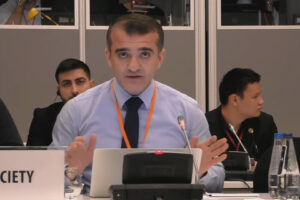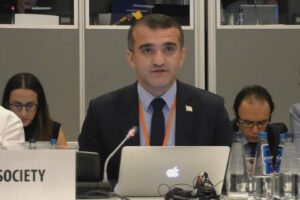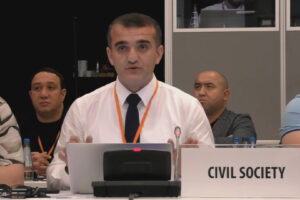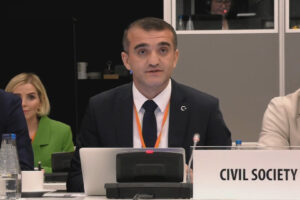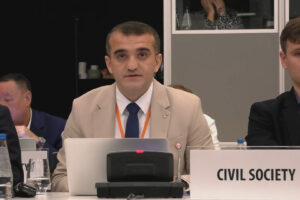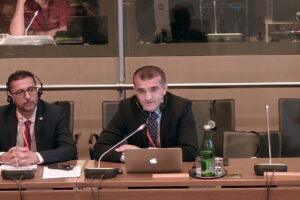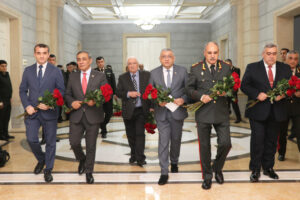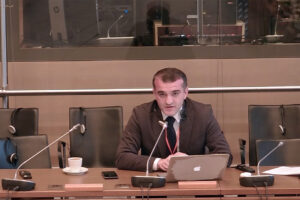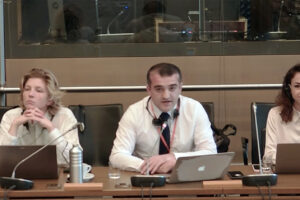Washington event: US backs independent voices, seeks ‘engagement’ with Azerbaijan

Washington on Monday made it clear that it will continue to support independent voices in Azerbaijan while seeking a way to “engage constructively” with the Azeri government.
“We want to engage with Azerbaijan more vigorously at government higher levels,” Thomas Melia, State Department deputy Assistant Secretary on Democracy, Human Rights and Labor, said at a National Endowment for Democracy event. “It’s important for our partners in the Azeri government to recognize what our interests really are: We want stability, prosperity for Azerbaijan… And we think, the key to that is more and more independent voices to be respected and allowed to what they are doing in the modern societies…”
Melia spoke at the event named “the Crackdown on Independent Voices in Azerbaijan,” which primarily focused on recent arrests, detentions, and media smear campaigns against independent activists, western institutions in the country.
Some rights defenders, former diplomats in Washington D.C. have been calling on the Obama Administration for sanctions against Baku amid crackdown. State Department has been emphasizing that recent harassment of international and local nongovernmental organizations in the oil-reach country was “unacceptable.”
Melia said Azerbaijan would ensure a better future and partnership with the US by being more inclusive and tolerant to independent voices.“Recognition of the rights of the citizens of Azerbaijan to exercise their fundamental freedoms – freedom of expression, association– is vital,” he said.
In order to get U.S.-Azerbaijani relations to “where we would like it to be,” Washington will “try to find common ground with Azerbaijan and try to move bilateral relationship,” he said.
A new U.S. Ambassador to Baku Robert Cekuta is expected to be arriving in Baku in next couple of weeks to carry on the dialog. Melia described it as an “important point of access for engagement,” adding that other Washington officials will also be seeking to visit Azerbaijan for that purpose.
Neither Ambassador Cekuta, nor his Azerbaijani counterpart in Washington, D.C. however appeared at the Monday event, which gathered over 100 participants who voices their support for Azeri civil society and the U.S. institutions, including RFE/RL’ local branch Radio Azadliq that was shuttled off later last month.
In the meantime, Melia did emphasize Washington’s continued support for RFE/RL in Baku describing it as “as strong as we can.”
In his speech, Kenan Aliyev, RFE/RL Azeri service director, mentioned Azerbaijan’s systematical target against international broadcasters and other institutions, saying that, Ilham Aliyev’s government is trying to take over total control of media, like Russia’s Vladimir Putin does. “But we will restore our service,” he said.
What happened to the Radio Azadliq in Baku, he said, was not ‘isolated: ’Several international organizations, including IREX , the National Democratic Institute, US Peace Corps were also kicked out of country…”
Another speaker Altay Goyushov, Azerbaijani Reagan-Fascell fellow at the National Endowment for Democracy, draw attention to Baku’s unprecedented crackdown while taking leadership role at Council of Europe last year, adding that, this “raises serious questions.”
“Azerbaijan was more democratic before it joined the Council of Europe,” he said, adding that CoE was changed by the Azeri regime, not vice versa.
For Goyushov, the lack of rule of law in Azerbaijan will pave the way for radicals. “This is a dangerous situation.”
Miriam Lanskoy, Director for Russia and Eurasia at the National Endowment for Democracy, said, Azerbaijan has been fabricating criminal cases to jail its best journalists, human rights activists and lawyers. There are 100 political prisoners in the country while it keeps growing along with ongoing crackdown against the civil society, putting Azerbaijan on the same human rights record as Uzbekistan.
“If you look at Freedom House figures for Azerbaijan in late 1990s, it was roughly on part with Georgia or Armenia, right now it is more like Uzbekistan… We’ve seen Azerbaijan decline in every standard of governance that Freedom House measures over the last 10 years,” she said.
Alakbar Raufoglu
Washington, DC
Washington event: US backs independent voices, seeks ‘engagement’ with Azerbaijan
 13 January 2015
13 January 2015
Washington on Monday made it clear that it will continue to support independent voices in Azerbaijan while seeking a way to “engage constructively” with the Azeri government.
“We want to engage with Azerbaijan more vigorously at government higher levels,” Thomas Melia, State Department deputy Assistant Secretary on Democracy, Human Rights and Labor, said at a National Endowment for Democracy event. “It’s important for our partners in the Azeri government to recognize what our interests really are: We want stability, prosperity for Azerbaijan… And we think, the key to that is more and more independent voices to be respected and allowed to what they are doing in the modern societies…”
Melia spoke at the event named “the Crackdown on Independent Voices in Azerbaijan,” which primarily focused on recent arrests, detentions, and media smear campaigns against independent activists, western institutions in the country.
Some rights defenders, former diplomats in Washington D.C. have been calling on the Obama Administration for sanctions against Baku amid crackdown. State Department has been emphasizing that recent harassment of international and local nongovernmental organizations in the oil-reach country was “unacceptable.”
Melia said Azerbaijan would ensure a better future and partnership with the US by being more inclusive and tolerant to independent voices.“Recognition of the rights of the citizens of Azerbaijan to exercise their fundamental freedoms – freedom of expression, association– is vital,” he said.
In order to get U.S.-Azerbaijani relations to “where we would like it to be,” Washington will “try to find common ground with Azerbaijan and try to move bilateral relationship,” he said.
A new U.S. Ambassador to Baku Robert Cekuta is expected to be arriving in Baku in next couple of weeks to carry on the dialog. Melia described it as an “important point of access for engagement,” adding that other Washington officials will also be seeking to visit Azerbaijan for that purpose.
Neither Ambassador Cekuta, nor his Azerbaijani counterpart in Washington, D.C. however appeared at the Monday event, which gathered over 100 participants who voices their support for Azeri civil society and the U.S. institutions, including RFE/RL’ local branch Radio Azadliq that was shuttled off later last month.
In the meantime, Melia did emphasize Washington’s continued support for RFE/RL in Baku describing it as “as strong as we can.”
In his speech, Kenan Aliyev, RFE/RL Azeri service director, mentioned Azerbaijan’s systematical target against international broadcasters and other institutions, saying that, Ilham Aliyev’s government is trying to take over total control of media, like Russia’s Vladimir Putin does. “But we will restore our service,” he said.
What happened to the Radio Azadliq in Baku, he said, was not ‘isolated: ’Several international organizations, including IREX , the National Democratic Institute, US Peace Corps were also kicked out of country…”
Another speaker Altay Goyushov, Azerbaijani Reagan-Fascell fellow at the National Endowment for Democracy, draw attention to Baku’s unprecedented crackdown while taking leadership role at Council of Europe last year, adding that, this “raises serious questions.”
“Azerbaijan was more democratic before it joined the Council of Europe,” he said, adding that CoE was changed by the Azeri regime, not vice versa.
For Goyushov, the lack of rule of law in Azerbaijan will pave the way for radicals. “This is a dangerous situation.”
Miriam Lanskoy, Director for Russia and Eurasia at the National Endowment for Democracy, said, Azerbaijan has been fabricating criminal cases to jail its best journalists, human rights activists and lawyers. There are 100 political prisoners in the country while it keeps growing along with ongoing crackdown against the civil society, putting Azerbaijan on the same human rights record as Uzbekistan.
“If you look at Freedom House figures for Azerbaijan in late 1990s, it was roughly on part with Georgia or Armenia, right now it is more like Uzbekistan… We’ve seen Azerbaijan decline in every standard of governance that Freedom House measures over the last 10 years,” she said.
Alakbar Raufoglu
Washington, DC
 @
@










